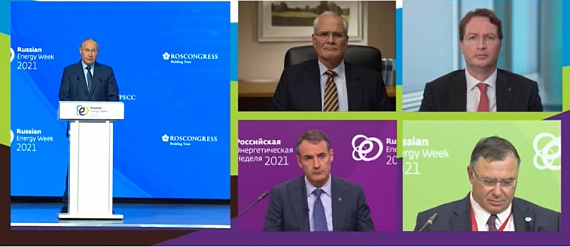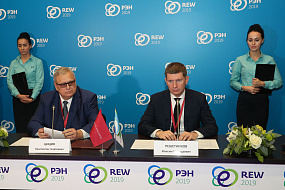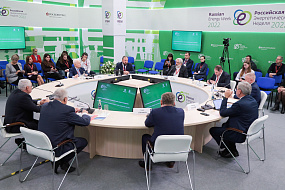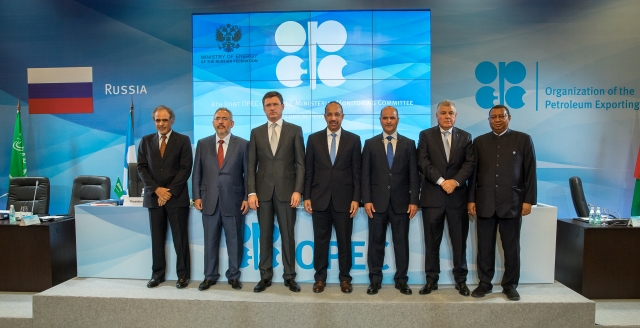Vladimir Putin addresses Russian Energy Week plenary session

Vladimir Putin addressed the plenary session on ‘Global Energy: Transformation for Development’ at the Russian Energy Week International Forum. President of Angola and chair of the 2021 OPEC conference João Lourenço also took part in the discussion on current trends in the global fuel and energy sector, along with heads of leading global energy companies.
The energy sector has felt the full impact of the crisis caused by the COVID-19 pandemic, Putin said in his opening address at the plenary session. “The disruption to regional energy markets has once again shown the importance to the modern world of the stable and reliable functioning of the fuel and energy sector and the supply of affordable energy to consumers with a minimal environmental impact.”
“In order to secure the
planet’s energy and environmental security we need balanced and responsible
actions from all market participants, including both producers and consumers,
focusing on the longer term in the interests of the sustainable development of
our countries and ensuring the wellbeing of our people,” the President said at
the REW 2021 plenary session.
Global demand for energy
resources fell sharply in 2020 as a result of the restrictions, the slowdown in
business activity and the suspension of production and transportation. This led
to a 4.7% reduction in global consumption of primary energy, which was the most
serious shock to the sector for 70 years, the President said. At the same time,
the fall in demand was followed by a price correction. As Putin noted, natural
gas prices in Europe fell by a factor of two and a half, from USD 282 per
thousand cubic metres in 2018 to USD 113 in 2020. “The situation in the oil
sector was utterly unique. None of us, absolutely no one would have believed or
could even have imagined what took place last spring when the price of oil
turned negative for the first time in history. Storing oil became more
expensive than paying for it. This is simply a unique situation,” the head of
state said.
Nevertheless, the subsequent
OPEC+ agreements played a key role in stabilizing the oil market, the President
continued. He added that OPEC member countries and nations that are not part of
the organization managed to establish effective cooperation, ensure the
stability of the oil sector amidst the pandemic and, most importantly, create
the necessary conditions for investment. He added that the cooperation
agreement will be valid until the end of 2022.
Unlike oil, however, the
situation on the gas market still looks unbalanced and unpredictable,
particularly in Europe. “The main reason for this is that not everything in
this market is the result of producer behaviour: gas consumers play an equal or
even a greater role. Over the last ten years, the share of renewable sources in
the European energy mix has increased sharply, which appears to be a good
thing. It is now a significant and notable presence in the sector. A key
feature of renewable power, however, is the volatility of its generating
capacity. Large reserve capacities are required and, where serious outages occur,
primarily as a result to weather factors, existing reserves are simply
insufficient,” the head of the Russian government said.
The President also stressed
that the increase in gas prices in Europe was a consequence of an electricity
shortage, rather than the other way around. “Systemic flaws have slowly seeped
into European energy over the last decade, leading to a major market crisis on
the continent. When nuclear and gas were the leading energy sources there were
no crises of this kind, as there were no equivalent risk factors,” the
President said.
In this sense, Russia is fully
satisfying its contractual obligations to its partners, including those in
Europe, and is securing their guaranteed and uninterrupted gas supplies, Putin
said. “We are continually working to strengthen the energy security of the
entire European continent. Everything points to gas supplies to the global
market reaching record volumes by the end of the year. Moreover, we are always
willing to accommodate our partners and discuss additional measures,” he added.
Russia has already
commissioned and is using major infrastructure projects to supply gas to
Europe, including TurkStream, Balkan Stream, Nord Stream 1 and Nord Stream 2,
ensuring the stability and predictability of gas supplies. The
production of liquefied natural gas is also in constant development, the
President added. “By 2035, we expect LNG production in Russia to rise to 140
million tonnes per year and our position in this rapidly changing market to
strengthen to a share of around 20%, thanks to low production costs and
competitive logistics. Further to this, we expect our share in the global
supply of petrochemical products to increase to 7% by 2035 from a current level
of 1%,” he said.
In order to successfully avoid
similar energy crises in the future, we should make sure that the climate
agenda doesn’t become a tool for promoting the political and economic interests
of individual nations, the President said. On the contrary, global market
participants must agree on the global mechanisms needed to balance the energy
market, Putin continued. “We should launch meaningful and substantive dialogue between
energy producers and consumers on this matter, free from political bias and
platitudes. We are talking about hugely important issues that directly affect
the functioning of businesses and organizations, the wellbeing of households,
and millions of people both in Russia and in our partner countries, including in
Europe. I am confident that dialogue can help us to find solutions that take
into account market trends and the interests of all parties. Russia is ready
for constructive, trusting and close cooperation, including direct dialogue
with our partners in Europe and the European Commission to find common solutions
to stabilizing energy markets and combating climate change,” he said.
Changing conditions on the
global energy consumption market have certainly had a significant impact on the
strategies of many countries when it comes to ensuring future demand for energy
resources,” President of Angola João Lourenço noted at the plenary session. “The
growing impacts of climate change, increased concerns about the state of the
environment and the energy transition to a low-carbon economy are some of the
major topics on the current political agendas of various countries. Angola
should develop a national strategy for the sustainable extraction of its
mineral resources and move towards a gradual shift in the country’s energy
matrix in the medium and long term, creating opportunities for the development of
new renewable energy sources such as solar, wind and biomass,” he said.
That being said, main
countries are reserving an important role for gas in their energy strategy
while planning their transition. It is therefore important to continue joint
efforts to stabilize the global gas market in the interests of the consumers
themselves, Chairman and CEO of TotalEnergies Patrick Pouyanné said, in agreement
with the President. “Overall demand for gas, including LNG, is growing, and we
account for around 10% of the global LNG market. We are not happy with the high
prices of course, as this is bad not only for the company but our customers
too. We want to develop a system where coal is replaced by gas. This would have
a positive climate impact but it requires low prices. As it stands, coal is
becoming more attractive again when what we need is stability. We are
interested in long-term price formulas that make prices more predictable,” he
said.
The reliability of energy
supplies is one of the most important criteria when choosing a supplier today,
BP CEO Bernard Looney said in his presentation. “The energy sector must be
clean and safe, but above all else it should be reliable. Natural gas is a key factor
in bringing the system into balance. We should invest in storage
infrastructure, underground gas storage and the diversification of our energy
sources. This is essential if we want to create a comprehensive system with a
safety buffer. This is not just something that we would like to have, but a
necessary precondition for sustaining society,” the company head added.
The growing demand for
low-carbon energy sources is being seen not only in housing and utilities,
heating and manufacture, but in transport too, Chairman of the Board of
Management of Daimler AG and Mercedes-Benz AG Ola Källenius said at the plenary
session. “It will be very difficult for car manufacturers to raise capital from
long-term investors if they are unable to present a convincing decarbonization plan.
We are already being asked to provide plans for the rollout of electric
vehicles and the use of hydrogen and fuel cells. Developing infrastructure is
therefore a top priority, as we would be unable to transform the global economy
and completely switch to electric vehicles without it. I now believe that we,
as an automotive company, should be moving faster,” Ola Källenius said.





